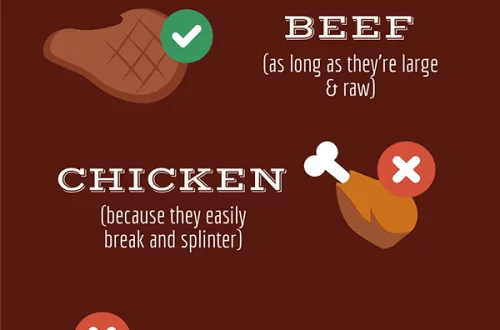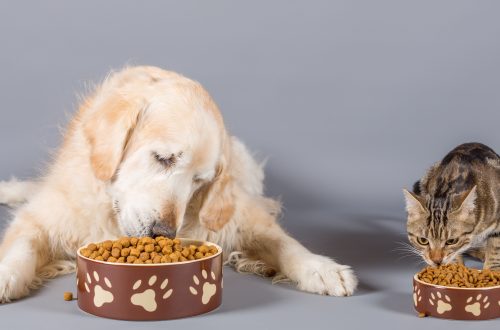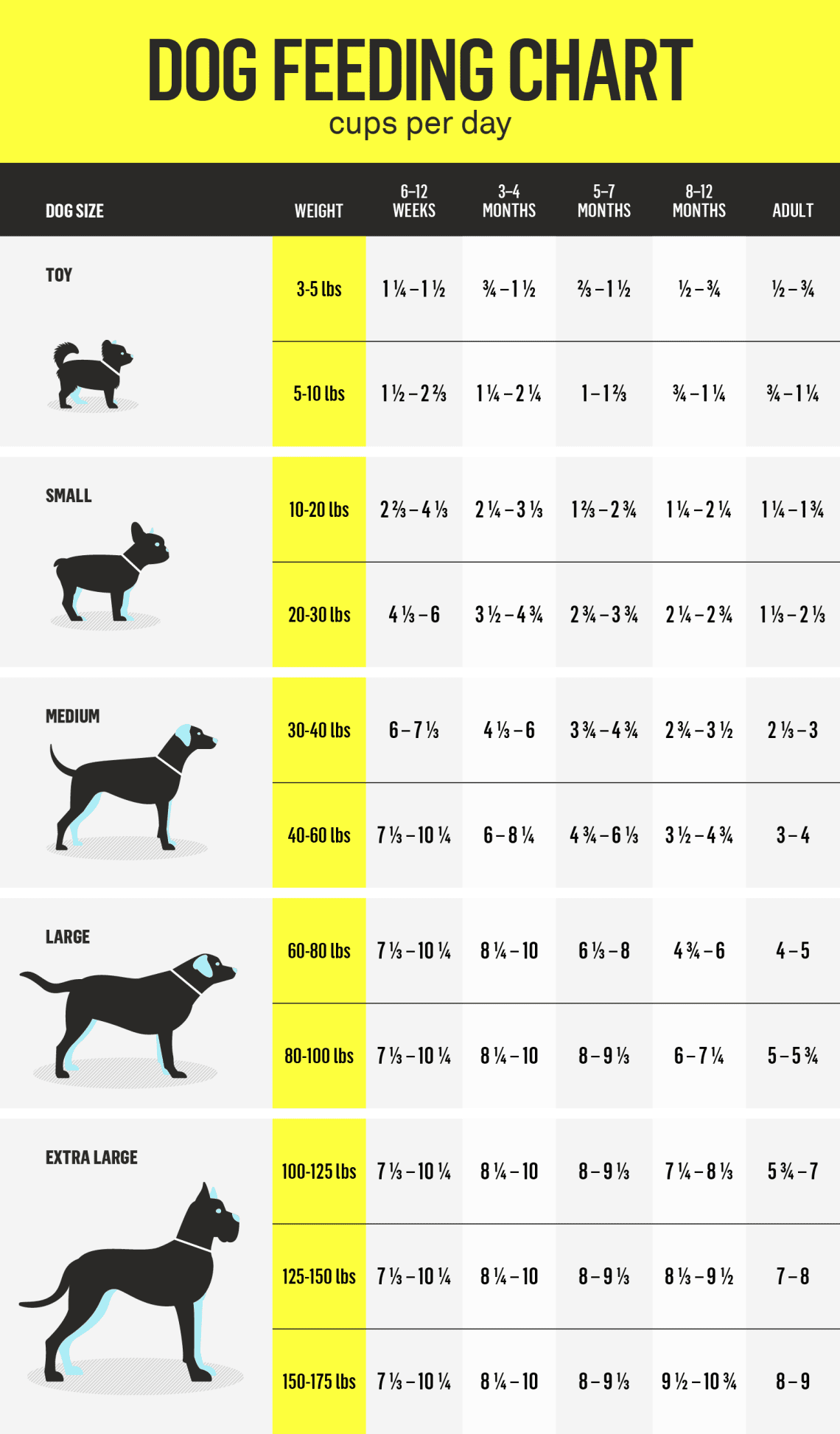
How much dry food to give a dog: the norm per day
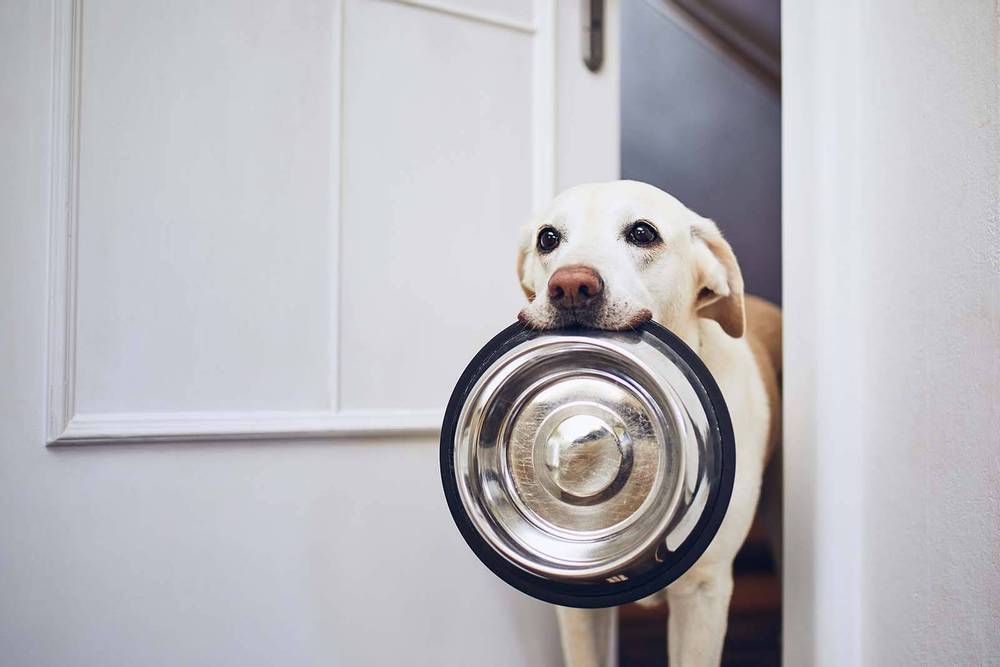
Contents
- Dog food norm – general recommendations
- What affects the amount of feed?
- How many times a day should you feed your dog?
- How much food should you give your dog per day?
- Rules for the nutrition of small dogs
- Nutrition rules for large and medium breeds
- How to determine the weight for one serving
- Fluid intake and dry food
Dog food norm – general recommendations
Due to the individual characteristics of the animal, the dosage of dry food may vary. This indicator is influenced by the age of the pet, its weight, breed characteristics and other factors. However, there are general recommendations on how many grams of dry food per day to give a puppy and an adult.
The dog’s Daily Calorie Requirement at Rest (RRC) is calculated using the formula:
KSP (kcal) u30d 70 x (weight, kg) + XNUMX
Puppy
Feeding frequency:
from three weeks to two months – 5-6 times;
from 3 to 6 months – 4 times;
6-8 months – 3 times;
from 8 to 12 months – the transition to two meals a day.
Daily calorie content (per kilogram of animal weight):
30-60 kilocalories per kilogram depending on age;
15-20 g of feed, respectively (with a calorie content of 370 kcal per 100 g / 3700 kcal per 1 kg of product).
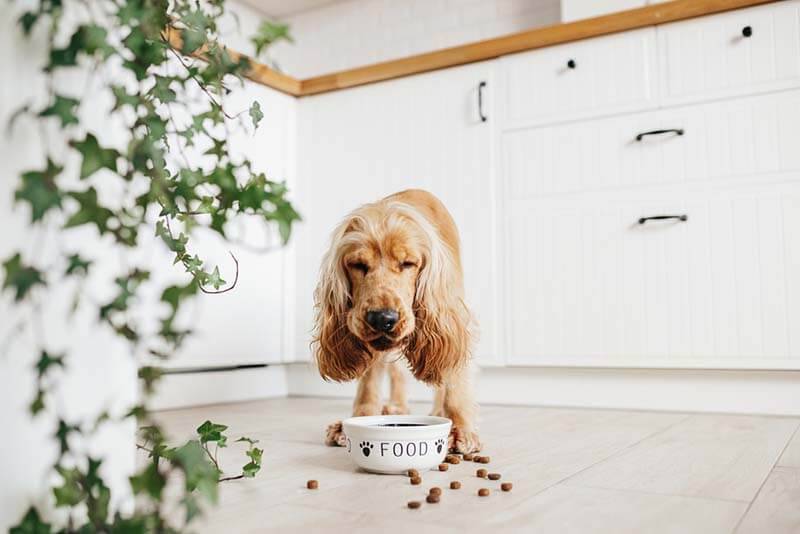
Adult dog
Feeding frequency: twice a day
Daily calorie content (per kg of animal weight):
Small breeds
30 kilocalories per kilogram;
5-10 g of feed, respectively (with a calorie content of 420 kcal per 100 g / 4200 kcal per 1 kg of product).
Medium breeds
30 kcal per kilogram;
10 g, respectively (with a calorie content of 320 kcal per 100 g / 3200 per 1 kg of product).
Large breeds
30 kcal per kilogram;
8 g of food, respectively (with a calorie content of 360 kcal per 100 g / 3600 per 1 kg of product).
To find out how many calories per day a particular dog needs, the resulting CSP is multiplied by a certain coefficient:
Neutered / uncastrated adult dog: 1,6 / 1,8
Inactive/obese: 1,2–1,4
Need to lose weight: 1
Need to get better: 1,2–1,8
Very active, working dogs: 2-5
Puppy (up to 4 months old): 3
Puppy (4 to 6 months): 2
Puppy (6 to 8 months): 1,2
Pregnant: 1,1–1,3
Lactating dog puppies: 2-2,5
Once you have determined your dog’s daily calorie allowance, calculate how much food to feed him. To do this, find out how many calories are contained in one gram of the given product. So, if its packaging indicates that the energy value per 100 g of the product is 450 kcal, then 1 g contains 4,5 kcal.
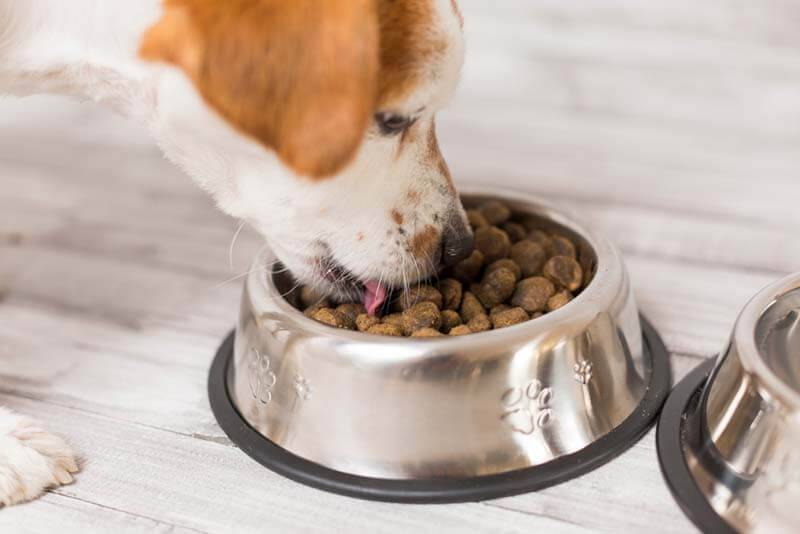
examples:
Three-month-old puppy weighing 3 kilograms, food with a calorie content of 360 kcal (1 g u3,6d XNUMX kcal).
KSP u30d 3 x 70 + 160 uXNUMXd XNUMX kcal
The coefficient is 3, which means that your baby needs
160 x 3 = 480 kcal
Calculate how much food you need per day:
480/3,6 = 135 years
With four meals a day, each serving of food will be:
135/4 = 35 years
Adult castrated dog weighing 11 kg, food with a calorie content of 320 kcal (1 g = 3,2 kcal).
KSP u30d 11 x 70 +400 uXNUMXd XNUMX kcal
The coefficient is 1,6, which means that your dog needs
400 x 1,6 = 640 kcal
Calculate how much food you need per day:
640/3,2 = 200 years
Given that the dog should eat 2 times a day, the morning and evening servings of food will be equal to:
200/2 = 100 years
What affects the amount of feed?
First of all, the rate of dry dog food depends on the characteristics of the animal itself. Important is the calorie content of the feed and its saturation with fiber, fats and carbohydrates, as well as other nutrients. Here’s what you should pay attention to when calculating the amount of food for your pet.
Age
Puppies should be fed more often and in small portions, adult dogs less often, but the portion size should be larger.
The weight
The rate of dog food varies based on this indicator: the more the pet weighs, the more portion it needs for satiety and energy.
Size
Large and small dogs need different amounts of food, so the norms for feeding them differ.
Breed
Dogs of the Great Dane breed, for example, need ten times more food than a representative of the Chihuahua breed.
Mobility
The amount of food consumed increases in dogs that lead a very active lifestyle. Running, playing and hunting, the pet spends a lot of energy and needs to replenish it through food.
Health status
The serving size and frequency of feeding dry food to dogs may vary depending on the health of the pet. An ill pet may need more nutrients for a speedy recovery and recovery.
Feed calories
Calorie content is indicated on each package – usually the number of calories is indicated per 100 grams or kilogram of the product. So, a portion of high-calorie feed should be precisely adjusted so that the pet does not overeat, low-calorie – so that he can be properly satiated.
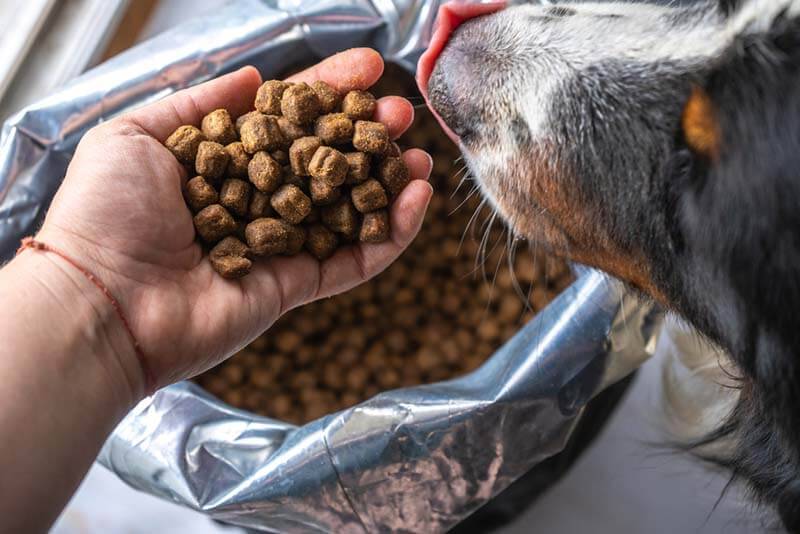
How many times a day should you feed your dog?
The number of meals depends primarily on the age and weight of the pet, as well as the state of his health.
Recommendations for puppies
For puppies, there is a norm: for example, the dosage of dry food and the frequency of feeding depends not only on weight, but on the weeks and months that have passed since birth. At first, starting from the fourth week, the puppy is accustomed to dry food after mother’s milk: they are fed 3-4 times a day in small portions, the food is soaked in water. When the baby gets comfortable, the frequency of meals is adjusted to 5-6. It is worth noting that it is worth feeding in equal portions at the same time, accustoming the puppy to the diet.
From two to four months, four meals a day are recommended. Portions are given every 4 hours, and the pet should receive the first 25% of the daily allowance in the morning.
Then they switch to three meals a day, and from 6 months to a year, the number of daily feedings is gradually reduced to two times.
Recommendations for adult dogs
From 10-12 months, pets are transferred to the “adult” mode – they are fed once or twice a day. In the morning they feed 50% of the daily dose, after 12 hours – the remaining 50%. It is worth observing the feeding regimen throughout life, deviations are allowed only during medical manipulations (testing, surgery, ultrasound).
An exception may be pregnant, recently whelped or elderly individuals. For them, the volume of servings and the frequency of their serving can increase or decrease as needed.
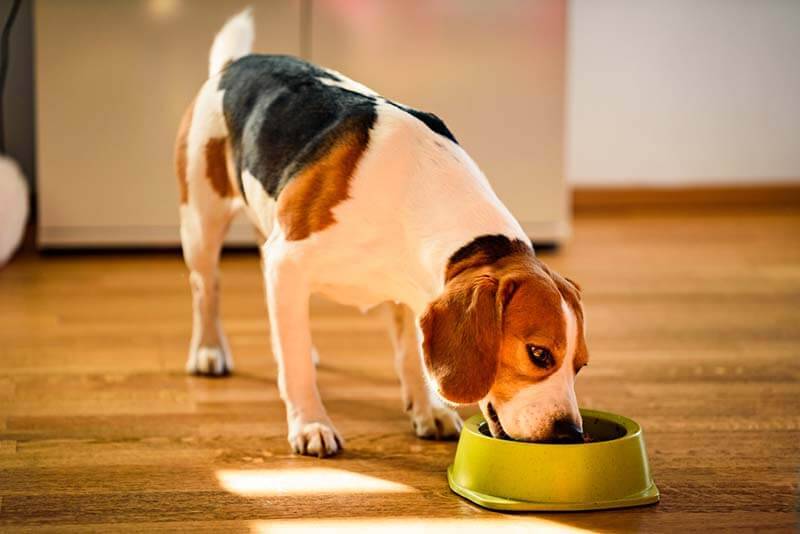
How much food should you give your dog per day?
The amount of portions given to the pet is calculated based on several parameters. We present a table. Based on the data in it, you yourself can easily calculate how much food to give your dog per day.
Puppy Food Rate Chart
Taking into account the fact that the babies are given a double portion, we present a table that shows the approximate dose for feeding puppies with dry food.
Puppy weight, kg | Up to 4 months calories per day | Up to 4 months grams of feed | 4-6 months calories per day | 4-6 months grams of feed | 6-8 months calories per day | 6-8 months grams of feed |
1 | 300 | 80 | 200 | 55 | 120 | 35 |
2 | 390 | 105 | 260 | 70 | 156 | 45 |
3 | 480 | 130 | 320 | 90 | 192 | 55 |
4 | 570 | 155 | 380 | 105 | 228 | 65 |
5 | 660 | 180 | 440 | 120 | 264 | 75 |
6 | 750 | 205 | 500 | 135 | 300 | 85 |
7 | 840 | 230 | 560 | 150 | 336 | 95 |
8 | 930 | 250 | 620 | 170 | 372 | 105 |
9 | 1020 | 275 | 680 | 185 | 408 | 115 |
10 | 1110 | 300 | 740 | 200 | 444 | 120 |
15 | 1560 | 420 | 1040 | 280 | 624 | 170 |
For example, food was taken, the energy value of which is 370 kcal per 100 g of product (1 g = 3,7 kcal).
It is easy to recalculate how much food of a different calorie content to give a puppy: take the number of calories needed for your pet per day and divide by the number of calories in one gram of food. Remember to divide the amount of food received into equal parts according to the number of feedings (2-6).
We tell you how to correctly calculate how much dry food to give an adult dog. In all tables, the CSP is taken with a unit coefficient.
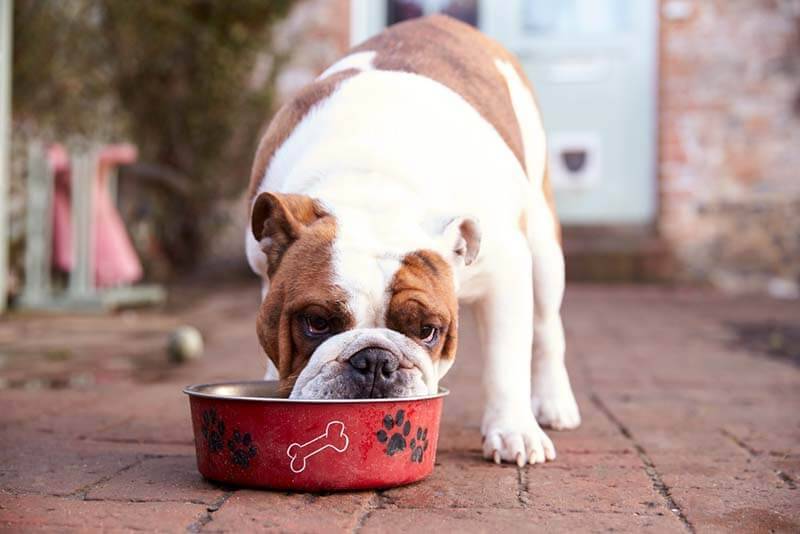
Table of food norms for dogs of small breeds
For this table, a feed with a calorie content of 420 kcal was taken (1 g u4,2d XNUMX kcal).
Dog weight, kilograms | Norm of calories per day, kcal | Feed rate per day, grams |
2 | 130 | 30 |
3 | 160 | 40 |
4 | 190 | 45 |
5 | 220 | 55 |
6 | 250 | 60 |
7 | 280 | 70 |
8 | 310 | 75 |
9 | 340 | 80 |
10 | 370 | 90 |
Referring to the table, you can independently calculate the dosage of feeding dogs with dry food, taking into account the coefficient.
Since an adult dog needs to be given dry food 2 times a day, it is worth dividing the received daily allowance into two equal portions.

Feed rate table for medium breeds
For the calculation, a calorie content of 320 kcal per 100 g of the product was taken (1 g – 3,2 kcal).
Dog weight, kilograms | Norm of calories per day, kcal | Feed rate per day, grams |
12 | 430 | 135 |
13 | 460 | 145 |
14 | 490 | 155 |
15 | 520 | 165 |
16 | 550 | 170 |
17 | 580 | 180 |
18 | 610 | 190 |
19 | 640 | 200 |
20 | 670 | 210 |
To find out how much food to give a dog per day, you need to take from the table the calorie intake per day corresponding to the weight of your pet, divide it by the number of kilocalories in one gram of the food you have chosen and multiply the result by the appropriate coefficient.
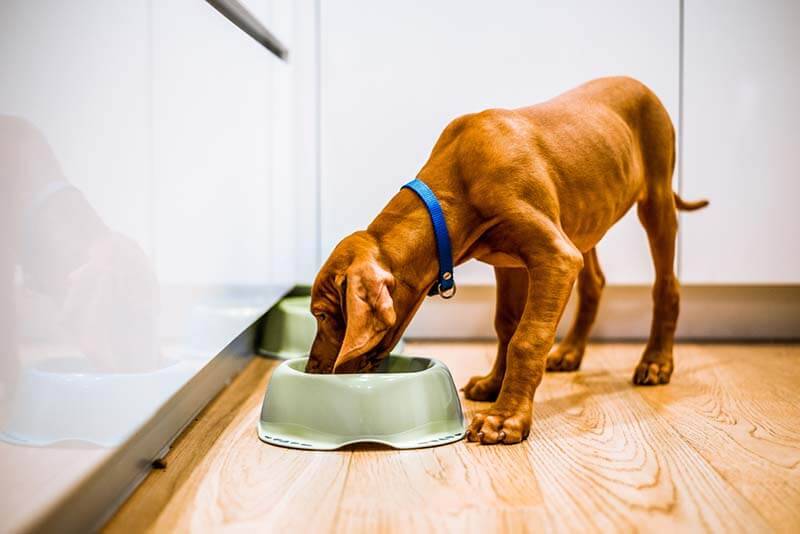
Feed rate table for large breeds
The calorie content of the feed is 360 kcal.
Dog weight, kilograms | Norm of calories per day, kcal | Feed rate per day, grams |
25 | 820 | 230 |
30 | 970 | 270 |
35 | 1120 | 310 |
40 | 1270 | 355 |
45 | 1420 | 395 |
50 | 1570 | 435 |
55 | 1720 | 480 |
60 | 1870 | 520 |
65 | 2020 | 560 |
The calculated feed rate must be divided into 2 meals – in equal portions.
Calculation of the daily portion for different types of food
The calculation of the rate of food for dogs is made according to the KSP formula (kcal per 1 g of food). It should be noted that with the growth of the energy value of the product, its dosage decreases.
dog size | Economy, 280-320 kcal | Premium, 320-400 kcal | Super premium, 400-450 kcal | Holistic, 400-450 kcal |
Small (up to 12 kg) | 115-130 g per day | 95-115 g per day | 80-95 g per day | 80-95 g per day |
Medium (from 12 to 28 kg) | 210-240 g per day | 170-210 g per day | 150-170 g per day | 150-170 g per day |
Large (from 30 kg) | 400-455 g per day | 320-400 g per day | 280-320 g per day | 280-320 g per day |
Puppy (up to 2 kg) | 120-140 g per day | 100-120 g per day | 90-100 g per day | 90-100 g per day |
Puppy (up to 4 kg) | 180-205 g per day | 180-145 g per day | 130-145 g per day | 130-145 g per day |
Puppy (up to 6 kg) | 235-270 g per day | 190-235 g per day | 170-190 g per day | 170-190 g per day |
The table shows an approximate index of the amount of dry food for an adult dog per day. Do not forget to multiply the number from the table by the coefficient that suits your dog.
For puppies, age up to 4 months is taken (from 4 to 6 months – divide the number from the table by 1,5; from 6 to 8 months – by 2,5).
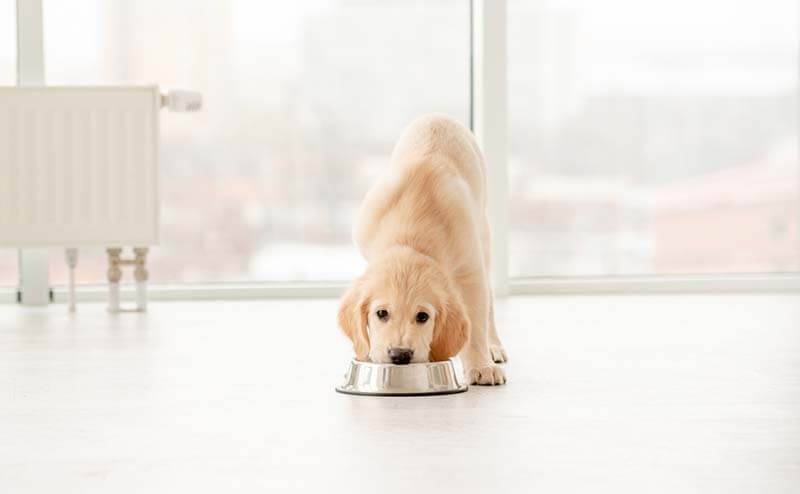
Rules for the nutrition of small dogs
A distinctive feature of such animals is accelerated metabolic processes. This is facilitated by their inherent activity, nervous excitability, strong heat loss and a large liver in relation to the body.
Required dry food:
consisting of small granules;
high-calorie;
easily digestible;
balanced;
full-time;
optimal calorie content (370–400 kcal per 100 g).
Feeding rules:
portions should be small;
scheduled meals;
give food at about the same time every day;
feed twice a day (optimal);
do not feed ordinary food from the table;
do not resort to feeding.
Nutrition rules for large and medium breeds
Medium breeds have a slower metabolism than small breeds, and large breeds even slower. Accordingly, the number of calories needed per unit of body weight is lower. Therefore, the calorie content of feed for them, unlike small ones, should not be high.
Required dry food:
consisting of medium and large granules;
average caloric content;
balanced;
full-time;
containing glucosamine (for joints).
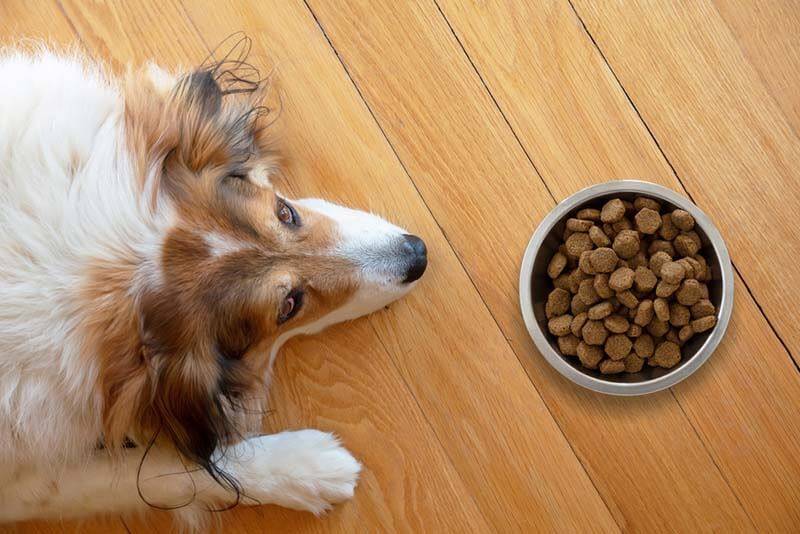
Feeding rules:
2 times a day (breakfast and dinner);
serving food daily at the same time;
in the dosage, take into account activity and age;
do not leave uneaten food in the bowl;
monitor the presence of substances for the joints.
When choosing food and calculating how much dry food to give per day, be sure to consider the individual characteristics of your dog.
How to determine the weight for one serving
There are several ways to determine portion weight.
Weighing. After placing a certain amount of granules in a bowl, put it on the scales and record the result. Remove/add granules as needed. Don’t forget to take into account the weight of the bowl.
Use of dispensers. You can purchase suitable measuring spoons or glasses and use them to measure the required portion weight.
Eye definition. It is acceptable if you have repeatedly fed the animal and imagine how voluminous the given portion looks.
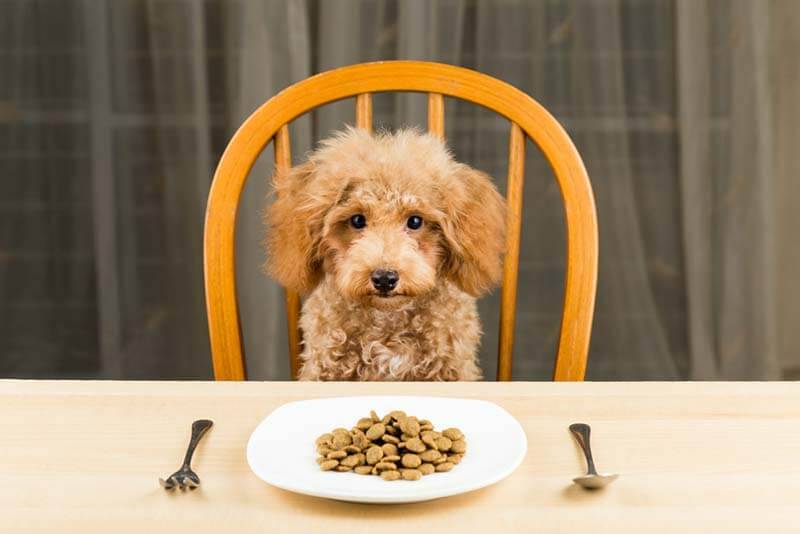
Fluid intake and dry food
Water is an essential element for the life and health of a dog. It is especially important not to forget about this when giving your pet dry food. He should always have unhindered access to a bowl of water. Moreover, every day the bowl needs to be changed: pour out the contents, wash the container and pour fresh water into it.
The norm of water per day: on average, it is believed that 75 ml of water per kilogram of body weight of an animal. In relation to dry food, the volume of water is calculated by tripling. So, if the daily norm of food for dogs is 350 grams, then they must consume at least a liter of water per day.
July 2 2021
Updated: July 2, 2021



